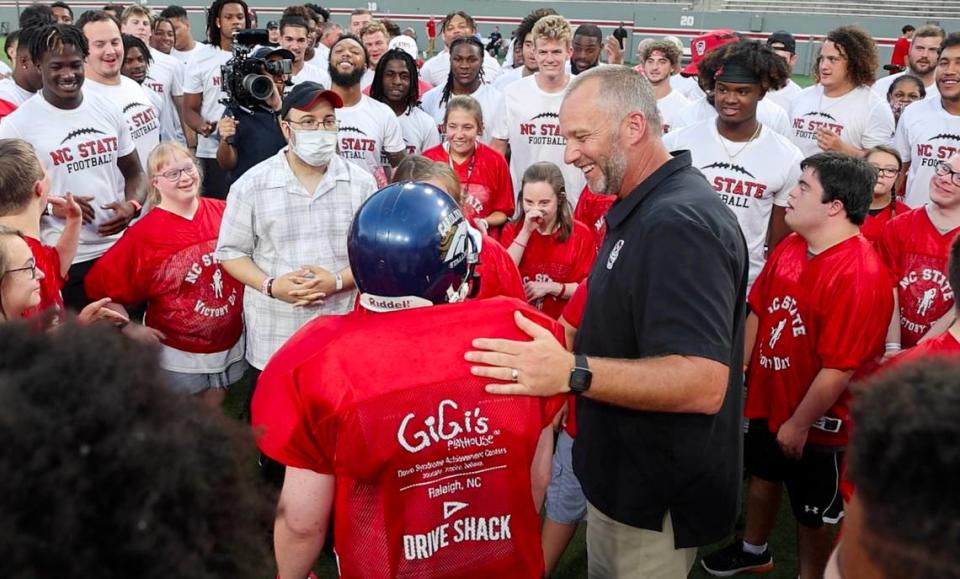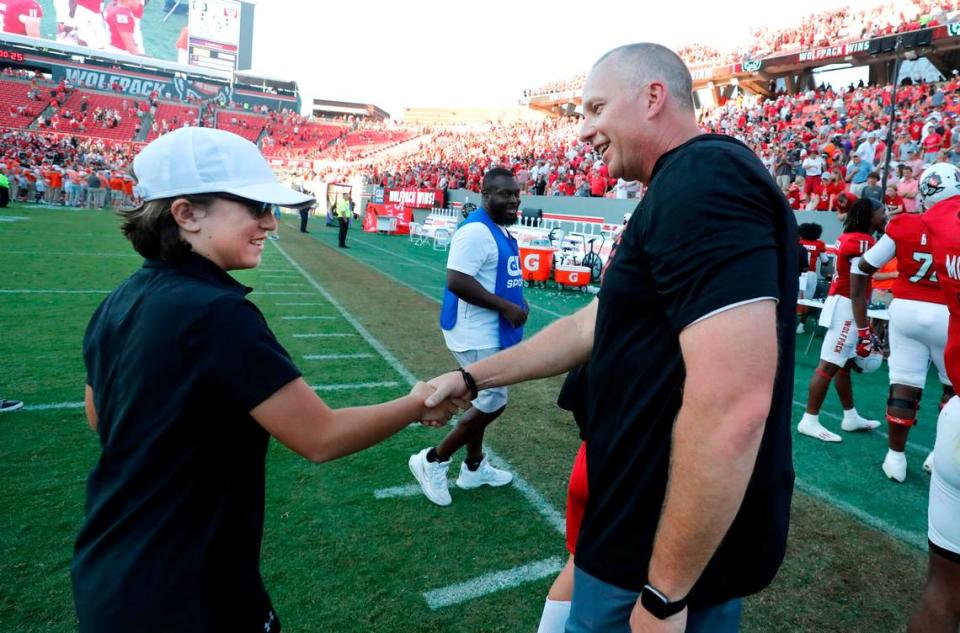Redefining strength: Doeren family funds NC State program to help neurodivergent students
N.C. State football coach Dave Doeren proudly welcomes Gigi’s Playhouse participants to campus for its annual “Victory Day” and weekly meetings with the players.
Some of the team’s interns connected with the program through those activities. He also invited Payton Gibbs, a Florida girl with autism, to serve as a guest coach last season.
Doeren’s advocacy, fueled by his son’s experience with autism, led to the creation of a new student services program: OnePack Empowered.
The program, which completed its pilot semester in the spring, is designed to help neurodivergent students navigate higher education and personal development. Neurodivergence encompasses students with autism, dyslexia, bipolar and obsessive compulsive disorders.
OnePack Empowered uses an individualized process-driven approach for each student.
Program manager Sidney Fletcher said the most common needs are executive functioning like problem solving and time management; communication and self-advocacy skills; sensory regulation; and career development.
The program worked with 15 students and will double its student participants in the fall for its official launch. More important than the numbers, the efforts worked. Students of various ages and majors found success, belonging and confidence.
“That’s one of the best things I’ve done, for sure,” Doeren said in June. “We get the testimonials. They send me emails that they’re getting from parents of the students that are in it. It’s helping people, and that’s why we created it.”

Serving an underserved community
A doctor told Dave and Sara Doeren their eldest son, Jacob, had autism and wouldn’t live independently or have a job. He was 3, maybe 4, at the time.
Jacob graduated from Appalachian State in May with his bachelor’s degree in sustainable energy and technology. He is pursuing a master’s degree.
We couldn’t be more proud of our oldest son - graduating from App. State and starting Grad School! Beautiful weekend in the Mountains of NC! Blessed!!! pic.twitter.com/76MU18gMcr
— Dave Doeren (@StateCoachD) May 12, 2024
Doeren credits Louisburg College and the App State As-U-R program for helping his son, both schools developed plans to ensure Jacob could reach his personal, professional and academic goals.
With the assistance of N.C. State Chancellor Randy Woodson and a $1.25 million gift, the Doerens helped establish OnePack Empowered to give Wolfpack students similar opportunities.
Doeren shared the idea with Woodson, who had a task force ready to create the program six months later.
NC State football coach Dave Doeren pledges funds for new special needs program
“We wouldn’t be here without him,” Doeren said. “I pitched him ‘Why,’ and he said, ‘Give me time and we’ll get it done.’”
The donation will fund the project for five years, but Doeren hopes the university and its supporters will help continue the program for years to come.
“We have the biggest institution in the state with the most alumni, and we should be serving his community better,” Doeren said. “It was so apparent how needed that program was here. [It] feels good to give back to the school that’s given me so much.”

Changing the model of strength, success
N.C. State hired Fletcher a year ago to build the program after spending over a decade working with UNC-Greensboro and High Point University in disability services and connecting students to appropriate resources.
“I’m really fortunate and appreciative that this position has just been so wonderful,” Fletcher said. “I’ve grown so much and I’ve learned so much, especially when it revolves around specific strategies, techniques and levels of support for neurodivergent students.”
OPE has a goal of 50 students per semester in the future. N.C. State is hiring two more staff members and hopes to eventually use graduate assistants as the program grows.
Each student is given one-on-one mentoring and is required to meet for one hour each week, though some students may request more time. Fletcher provided mentoring for every student last semester, working with them to set goals and practical ways to reach them through planning, strategizing and other skills.
Goals were set up with a tiered, process-driven system, so students could make measured progress on each one. For example, he would have them check in when they accomplished the first part of a goal — like going to the library — and then proceed to the next task. Soon, they finished tasks and reached smaller milestones on their own.
All meetings are done in the coaching room, which is designed to limit sensory overload. It features soft lighting, comfortable seating, a yoga mat, sound machine, adult coloring books and vision devices.
Participant Autumn-Skye Williams said the program contributed directly to their success, notably organizing tasks into time stamps to ensure goals were met.
“Furthermore, Sidney helped both academically and emotionally,” Williams said. “He is a support and friend that I could rely on when dealing with issues revolving around my ADHD that I couldn’t get from colleagues around me. Without him, I wouldn’t have felt as confident as I do this semester.”
OPE focuses on a strength-based approach, balancing validation and accountability. Fletcher said he wants students to know they’re not broken or the source of challenges but the system they’re living in isn’t designed for the biological differences in thinking and processing.
“I think the important piece is that we want to just emphasize that we accept students as their authentic selves, and we want to encourage and support their neurodivergent talent,” Fletcher said. “We’re seeing neurodivergence as a source of strength.”
Students and families interested in the program are encouraged to fill out an online interest form. From there, they set up a Zoom meeting to discuss in more detail the student’s background. Students must show need but they are not required to show proof of diagnosis.
If both parties think OPE could be beneficial, the student fills out an official application and a more detailed assessment. All applications are reviewed by a committee, and students are then selected.
Fletcher said the program will still help students, even if they’re not officially in the semester’s cohort, by scheduling individual meetings or directing them to other resources. OPE wants to help as many students as possible while ensuring students within the program still get the best assistance.
Students are retained in the program after their initial acceptance.
“We are a very adaptive, adaptive and flexible model of holistic student support,” Fletcher said. “We recognize we can’t do everything, but that’s why we try to emphasize developing an ecosystem of support.”
As the program grows, OnePack Empowered needs more space for another coaching room and wants to create additional opportunities to ensure students are building personal and professional connections through employer site visits, career fairs and internships.
Fletcher expressed gratitude for the Doerens’ donation and ongoing advocacy, which has brought awareness, acceptance and support.
“You can be at this level of a head football coach, but you can recognize that there is a system beyond football in which students — everyone, people — need support and help,” Fletcher said. “I’m really trying to put it into words, but certainly this program would not exist without them. … Having someone or a platform that’s historically known for sports, it changes the model of how you view strength and what it means to be strong.”


